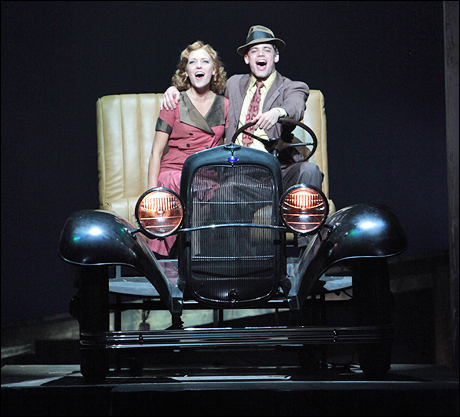In today’s Wall Street Journal drama column, I do the job on Bonnie & Clyde. Here’s an excerpt.
* * *
 “Bonnie & Clyde” isn’t the worst musical to open on Broadway in the past decade. It isn’t even the worst Frank Wildhorn musical to open on Broadway in the past decade. (That would be “Dracula.”) It is, however, quite sufficiently bad enough to qualify for the finals of this year’s What-Were-They-Thinking Prize. Why would anyone not obviously deranged put money into a show with music by a composer whose last three Broadway outings tanked? And who thought it was a good idea to write a commodity musical whose title gives the impression that “Bonnie & Clyde” is based (even though it isn’t) on a 44-year-old movie that is no longer well remembered save by upper-middle-aged baby boomers? Nor have Mr. Wildhorn and his feckless collaborators managed to beat these long odds: “Bonnie & Clyde” is so enervatingly bland and insipid that you’ll leave the theater asking yourself why you ever liked musicals in the first place….
“Bonnie & Clyde” isn’t the worst musical to open on Broadway in the past decade. It isn’t even the worst Frank Wildhorn musical to open on Broadway in the past decade. (That would be “Dracula.”) It is, however, quite sufficiently bad enough to qualify for the finals of this year’s What-Were-They-Thinking Prize. Why would anyone not obviously deranged put money into a show with music by a composer whose last three Broadway outings tanked? And who thought it was a good idea to write a commodity musical whose title gives the impression that “Bonnie & Clyde” is based (even though it isn’t) on a 44-year-old movie that is no longer well remembered save by upper-middle-aged baby boomers? Nor have Mr. Wildhorn and his feckless collaborators managed to beat these long odds: “Bonnie & Clyde” is so enervatingly bland and insipid that you’ll leave the theater asking yourself why you ever liked musicals in the first place….
As awful as Ivan Menchell’s book is–and it’s hopeless–it’s the score that makes “Bonnie & Clyde” unendurable. Mr. Wildhorn’s tunes sound like half-remembered middle-of-the-road AM-radio ballads from the ’70s, touched up with banjo and dobro to give them a theme-park period feel. Don Black’s gimcrack lyrics range from the instantly forgettable to the indelibly horrific…
Everybody in “Bonnie & Clyde,” Laura Osnes and Melissa van der Schyff in particular, can sing. The ability to act, alas, does not appear to have been so widely distributed among the members of the cast, though the phony-sounding regional accents might be confusing the issue somewhat….
* * *
Read the whole thing here.
Archives for December 2, 2011
TT: Almanac
“It is a grotesque misapprehension which sees in art no more than a craft comprehensible perfectly only to the craftsman; art is a manifestation of emotion, and emotion speaks a language that all may understand. But I will allow that the critic who has not a practical knowledge of technique is seldom able to say anything on the subject of real value.”
W. Somerset Maugham, The Moon and Sixpence
